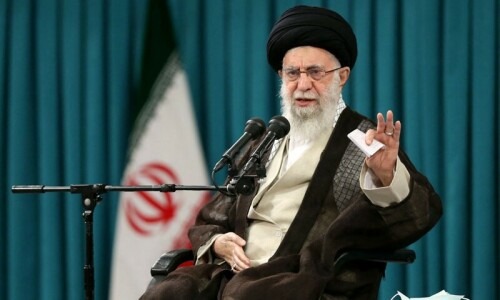In 2015, a TV commercial of a prominent Pakistani company that produces packaged spice mixes became extremely popular. According to a report in the marketing magazine Aurora, all nature of companies began asking their advertising agencies to create similar commercials for their brands.
The commercial showed two brothers living abroad in a shared apartment. On an Eid day, the younger brother confesses that he was missing their mother a lot. He wonders what food she might be preparing back home. His eyes swell with tears as he sadly leaves the apartment. The elder brother picks up an assortment of packaged spice mixes (made by the company) from a South Asian grocery store.
He then uses these to prepare various Pakistani dishes. When the younger brother returns, he sees his mother on a computer screen. On a table near the computer, the elder brother has laid out the dishes that he has prepared. The mother tells the son that Eid is not a day to shed tears. This generates even more tears, but these are of happiness.
Most advertising anywhere consciously tries to attract attention through ‘pathos’ and/or it constructs imagery and concepts which evoke emotions that are believed to already reside in an audience, needing a release. This is particularly true in South Asian advertising and also in the region’s art forms, such as music, films, soap operas, etc.
Politicians, much like carefully crafted adverts, frequently rely upon the public’s empathy with pathos in order to cultivate a more sympathetic image of themselves in the eyes of the masses
This arises from an old narrative which has mythologised the belief that South Asian societies are ‘very emotional’. I use the word ‘mythologised’ because this belief has never been — for lack of a better word — ‘scientifically’ substantiated. Of course, one can say that the popularity of the mentioned TV commercial can be seen as an example of the kind of traction that pathos enjoys in Pakistani society.
Indeed, but one can also reference numerous similar examples in Western societies which, according to the South Asian narrative, are ‘spiritually empty’ and not very emotive. In February 2023, USA Today reported that a TV commercial of a dog food brand made millions of Americans cry. And many of these actually wanted to be seen crying. They did this by sharing teary-eyed memes.
Pathos is specifically used to elicit feelings. The one who applies it expresses emotion, but success in this regard depends on whether his/her audience is convinced to exhibit empathetic feelings as a response. Such a success for commercial brands is good for business and for making an ‘emotional connect’ with the consumers. But over the decades, pathos has also become a frequent political tool.
There is a particular photograph of the former Pakistani prime minister Imran Khan wiping off tears from his face. The photograph is at least three years old, but it keeps returning on social media. It appears during periods when Khan is facing increasing scrutiny in cases of alleged corruption and of instigating ‘anti-state violence’.
His opponents insist that the photograph was ‘staged’ to draw sympathy for him from his supporters who have been feeling besieged (as is he) since his ouster in April 2022. His admirers, of course, swear that the picture was genuine, even though there are multiple stories about exactly what it was that Khan was shedding tears for.

In the April 22, 2011 issue of The Guardian, the British author Patrick Barkham asked, “Do tears betray an unforgivable weakness or cast our leaders in a refreshingly human light?” He then added that male politicians have rushed to bare their sensitive souls in recent times. The idea of the ‘sensitive male’ has been getting very good press, especially from the ‘liberal’ crowd.
No wonder then, the TV ad of the spice company was highly praised by even the ‘progressive’ lot. Because had it been a daughter who was missing her mom and shedding tears, and another daughter cooking all those dishes, the commercial would have been castigated for being a chock-full of regressive clichés — and rightly so.
Nevertheless, pathos in essence banks on emotional cliches. On most occasions, it is largely employed to derive an empathetic response from women. Yet, women, especially in politics, may not be able to achieve a similar response. In a May 2011 essay for The Journal of Politics, Professor Deborah J. Brooks wrote that when a female politician sheds tears in public, it is usually believed that she is weak and not fit for office. But when a male politician does the same, he is perceived to be showing his ‘more human side’.
In fact, according to Barkham, “Women leaders are usually damned if they do cry and damned if they don’t.” And the damning can be done by other women as well. In 2017, when a female member of Khan’s party accused him of sending her lurid messages, she was viciously trolled by Khan’s large troll army on Twitter, and even mocked by many female members of Khan’s outfit.
The trolling left her in tears. Khan’s supporters suggested that politics was not the right profession for a person like her. As if allegedly receiving suggestive messages from a leader was normal political practice. The actual messages, on the other hand, were conveniently forgotten during the ensuing ‘debate’.
My own dipstick research on Khan’s ‘crying’ photograph demonstrates that it appeals to his female supporters the most. It’s pure pathos. An image of a grown man — albeit one who is revered as a messiah of sorts by some — shedding tears. The pathos in this case humanises the messiah who, thus, deserves forgiveness for many of his known and alleged transgressions. The second part of the message is that he is a sensitive man, as opposed to the cold and ruthless men he is fighting a ‘holy war’ against.
However, according to Barkham, “The most profitable political tears are probably those shed when a politician is confronted with a tragedy that is not the demise of their own careers.” In 2007, Nawaz Sharif’s reputation among many of his opponents in the Pakistan Peoples Party (PPP) was greatly enhanced when he could not hold back his tears when told that his former nemesis, the PPP chairperson Benazir Bhutto, had been assassinated.
But Khan’s tears are being used to lament his fall. Sharif’s crying was clearly spontaneous and nothing to do with pathos. Khan’s pathos, on the other hand, may re-energise his female supporters, but cannot save him from potentially being disqualified or jailed. What an ‘insensitive’ thought.
Published in Dawn, EOS, July 23rd, 2023
















































Dear visitor, the comments section is undergoing an overhaul and will return soon.